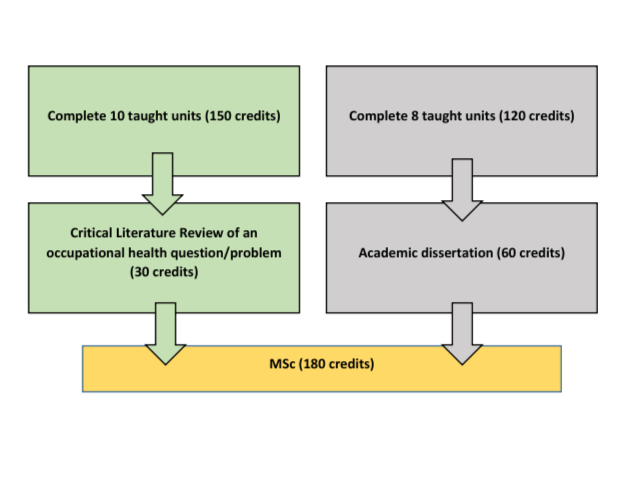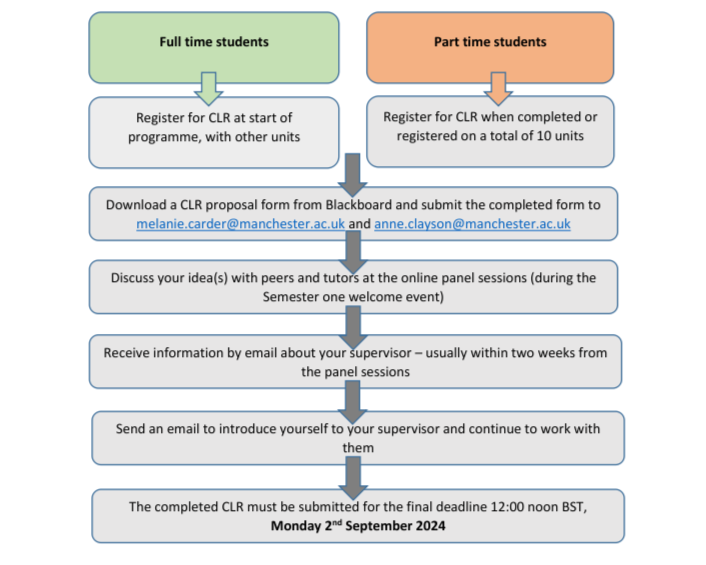
MSc Occupational Medicine and MSc Occupational Hygiene Critical Literature Review Handbook
Critical Literature Review Handbook
MSc Occupational Medicine and
MSc Occupational Hygiene
Academic Year 2023/24
This handbook is for those of you embarking on the 30 credit Critical Literature Review of the MSc. Refer to Blackboard Occupational Hygiene and Occupational Medicine Community / Your MSc Year for additional guidance and support. Use this handbook in conjunction with the MSc Occupational Medicine Programme Handbook and/or the MSc Occupational Hygiene Programme Handbook Faculty/University regulations.
Important Contacts
| Programme Directors | |
| Anne Clayson | Anne.Clayson@manchester.ac.uk |
| Melanie Carder | Melanie.Carder@manchester.ac.uk |
| Student Support | shs.wellbeing@manchester.ac.uk |
| Student Hub | SHS.hub@manchester.ac.uk |
| Programme Admin team | SHS.programmes@manchester.ac.uk |
Introduction
Students registered on the MSc programme have the option of completing a 30-credit Critical Literature Review as an alternative to the 60-credit dissertation. This requires students to take two additional taught units plus the 30-credit Critical Literature Review (producing the equivalent of 60-credits).

What is the Critical Literature Review (CLR)
In its simplest form, the CLR is an extended critical essay focusing on an occupational health research question or problem. The CLR will need to incorporate:-
- A clear research question/problem within which some of the sub-questions might include, for example: What is
the current knowledge gap; what needs to be found out to fully address the question/problem focused on in the
CLR - A clear structure/method for identifying the evidence. This is not to be confused with a more formal and detailed
Systematic Review, similar to what the Cochrane Collaboration, or others, would require. - Detailed critique and summary of the evidence as a whole, in relation to the original question/problem and what
this means in relation to the context/setting - Discussion/reflection on the strengths and weaknesses of the evidence that has been identified to answer the
initial question. This then needs to be considered in terms of the strength of the evidence – how much
confidence can be placed on these findings? What do they mean? How might it differ in different
settings/contexts? - What are the implications of what was found / what ought to happen next
Students can (but do not have to) extend work that they have used as part of a previous assessment/marked piece of work for the MSc. However, the CLR must extend this work, and cannot simply be the same material presented in a different format. Students are encouraged to reference the assignment and provide a brief description (just several sentences) to explain how the CLR extends the original assignment.
Intended learning outcomes
| Category of outcome | Students should be able to |
| A. Knowledge and understanding | A1 Describe a specific occupational health issue and establish a coherent research-related understanding question that forms the foundation of the critical literature review |
| B. Intellectual skills | B1 Use appropriate methodology to obtain the information necessary to address the research question |
| B2 Use appropriate methodology to synthesise the information collected | |
| C. Practical skills | C1 Construct a meaningful synthesis and critical interpretation of the results of information/evidence collected |
| C2 Explore the implications of the findings of the review | |
| D. Transferable skills and personal qualities | D1 Demonstrate the ability to be a reflective and self-directed learner, to accomplish a substantial piece of academic work |
Registering for the 30-credit critical literature review
OccMH students will register their preferred option (that is for (1) the dissertation or (2) additional units and the critical literature review) at the start of their final academic year. This process will be similar to that for selecting individual course units. Note that the fees for the critical literature review plus the two additional units, are the same as that for the option of
the dissertation.
Process flow chart
We recommend that all students consider the workload implications of the coursework for a taught course unit, and
their critical literature review. In the majority of cases, part time students are recommended to complete their 10 course units followed by the critical literature review. However, each student will have different circumstances and their own time management plans to consider. Occupational Hygiene MSc students can choose from the occupational medicine unit (Management of Occupationally Related Disease) or from units offered on the Masters of Public Health course. Occupational Medicine students can choose from the occupational hygiene units (Occupational Exposure Control and Occupational Exposure Assessment) or from units offered on the Masters of Public Health course. It is possible to choose two semester 1 units OR two semester 2 units, and conduct the CLR in the unoccupied semester. Alternatively, students can choose to do one semester 1 unit and one semester 2 unit, and work on the CLR alongside both units. Students should consider their time management and commitments when making these selections.

Do not leave it too late
Once a student has formally registered for the Critical Literature Review, they have to submit this by the Sept at the end of the academic year. In other words, students need to plan carefully for this work, alongside the additional units they must complete.
Submitting your idea
Students need to complete a short title form to indicate the title and a very brief outline of what they will be focusing on. This is formative only; it helps students to formulate their ideas and helps in the assignment of an appropriate supervisor. The CLR proposal form can be found in the ‘Your MSc Year’ area of the OccMH community space on Blackboard. Students should email the completed form by 23rd September 2023 to melanie.carder@manchester.ac.uk and anne.clayson@manchester.ac.uk. However, make sure you plan as much time as possible for working on your actual critical literature review. The earlier you start in the academic year, the better.
Academic supervision
Students will be allocated an academic supervisor soon after registering for the CLR. Students are responsible for making contact with, and introducing themselves to, their allocated supervisor.
Role of the supervisor
The role of the supervisor is to support a student’s academic development. Remember the project is the work of the student and not that of the supervisor. Students will have different needs for support and guidance. Some of the areas a supervisor might help with include:
- Helping students to develop a meaningful time plan for the months ahead
- Supporting the development of the structure of the critical literature review in terms of sections and themes that it includes
- Giving constructive feedback on sections of written work/preliminary drafts. This includes feedback on thegeneral style of writing, appropriate use of references, and the depth of critique/appraisal that the work contains and relevance to the original aims and objectives of the work
The Supervisor will not provide any comments/feedback on the additional course units that the student is undertaking
In addition:
- Supervisors aim to give feedback to students within 2 weeks of submitting drafts. As a result, it is important that students plan their time and allow for the return time for feedback on their work
- Please do not expect supervisors to be able to give feedback very close to the submission date. Also, this would not provide enough time for students to respond to their comments
- Supervisors are expected to provide 8 – 10 hours of support for the CLR. This includes reviewing student drafts and individual meetings.
N.B Supervisors are asked to let students know if they will be taking annual leave in August/early September. This will help students plan their work and when supervisory support can be provided. It is a good idea for students to clarify this with their supervisor.
Maximising supervision
Students are encouraged to maximise the opportunities for support from their academic supervisor. A few suggestions to facilitate this include:-
- Send supervisors an email as a way of introduction, a time plan, and any immediate concerns/support needs
- Identify specific queries or questions as a way of preparing for a discussion/meeting with the supervisor
- Have a good awareness of the marking template used to assess the final written work (see end of document). Knowing the assessment criteria helps guide a student’s work and supervisory discussion
- Make the supervisor aware of any difficulties affecting the ability to study. Students do not need to specify the detail, but enough to help the supervisor signpost the student to other sources of support. At the same time, it is helpful for any students with issues impacting on their studies, to let SHS.programmes@manchester.ac.uk know.
- Raise any issues associated with supervision by contacting melanie.carder@Manchester.ac.uk or
Anne.clayson@Manchester.ac.uk
Additional support
All students are encouraged to utilise the My Learning Essentials packages provided through the online UoM library.
There are also helpful resources provided in the MSc Occupational Medicine and Hygiene community space relevant to both the dissertation and the Critical Literature Review.
Word count
The word count for the critical literature review is 5000 words (penalties apply at 10% over the maximum). The same marking penalties as for a standard course unit assessment will apply.
The use of Artificial Intelligence (AI)
We urge students to be cautious when using a chatbot or AI tool within their learning. Chatbots and AI tools can be useful, but there are a number of risks associated with using them. Please ensure that you are aware of what is permissible use of AI for each assignment. You can utilise AI to generate ideas, key themes, and plan your assessment but not to write your assessment. Do not use AI to generate text, or partial text for use in your assessment unless the assignment brief explicitly states that this is permitted, otherwise use will be deemed academic malpractice. This is academic malpractice because the words and ideas generated are not your own and not an accurate reflection of your learning. Further to this, the words and ideas generated by the chatbot or AI tool may make use of other, human authors’ ideas without referencing them, which is plagiarism. Where a chatbot or other form of AI has been used, make sure you acknowledge that use. Information on how to cite can be found here: https://manchester-uk.libanswers.com/teaching-and-learning/faq/264824 Some units, for example those on AI and technology, permit the use of AI. However, they require you to sign a code of conduct which must be adhered to. Make sure you understand and follow these codes. If you are unclear on what is permissible, speak to the unit lead.
Using Appendices
Information in the appendices is not marked by the examiner and is not included in the word count. Therefore, whatever you include in the appendices must not form a considerable component of the work to be marked.
Referencing
The use of referencing will be assessed by the examiners. On this programme, the preferred referencing style is Harvard. However, Vancouver is acceptable. Students must correctly reference their work. Poor approaches to referencing can suggest academic malpractice. Guidance can be found on academic writing and referencing in the Study Skills course within the Study Support area of the MSc Occupational Medicine and Hygiene community space in Blackboard and from the University My Learning Essentials.
It is essential that students develop correct referencing within their work. There are a number of free online and cloud-based programmes to facilitate this process (including Endnote and Mendeley). Please ensure that the final reference list is produced correctly, especially if you are using an automated process, through Endnote/Mendeley for example.
Submitting your completed work
Students need to submit one electronic copy of their assignment using Blackboard. There is a specific submission
section on the main left hand menu, one for dissertations and one for the critical literature review. The final
submission date is 12:00 noon BST on Monday the 2nd of September 2024. Students can submit earlier than this, but they will not get their mark any earlier.
- Students need to submit work as .PDF or .DOC file.
- Ensure that the saved document has the correct formatting and layout, including the generated reference list. If working on a Mac computer, please save the document to a Word or .PDF format
- Use the same format for saving and submitting the file, as for the assignments (i.e. unit code followed by your student number)
- The submission box in Blackboard will become open nearer the final submission date.
Release of marks
Marks are usually released around mid-November and written feedback will be available in Blackboard. Note that the work must be submitted within the same academic year that the student registered for this specific unit.
Marking framework
Students work will be marked using the same process as for a taught unit assignment. The following table shows the marking criteria that will be used to mark the critical literature review. Note that the marking framework is specific to this critical literature review. Students should read this framework as it can help them understand core aspects to focus on in their written work.
| Score Band\Section weighting | Introduction- formulation of review question and rationale (20%) | Methodology – appropriate evidence search (25%) | Results – summary and critical appraisal of evidence (20%) | Discussion – implications of results for local public health practice, public health policy and future research (25%) | Presentation and Referencing (10%) |
| 90 – 100% Excellent | Work that is exceptionally outstanding with respect to all the criteria listed below | ||||
| 80 – 89% Excellent | Work that is of excellent quality throughout with respect to all the criteria listed below | ||||
| 70 – 79% Excellent: exceptional quality throughout |
|
|
|
|
|
| 60 – 69% Good pass: good to high quality |
|
|
|
|
|
| 50 – 59% Pass: satisfactory to good |
|
|
|
|
|
| 40 – 49% Fail: unsatisfactory |
|
|
|
|
|
| 30 – 39% Fail: unsatisfactory |
|
|
|
|
|
| 20 – 29% Fail: unsatisfactory |
|
|
|
|
|
| 0 – 19% Clear Fail: very poor quality |
|
|
|
|
|

